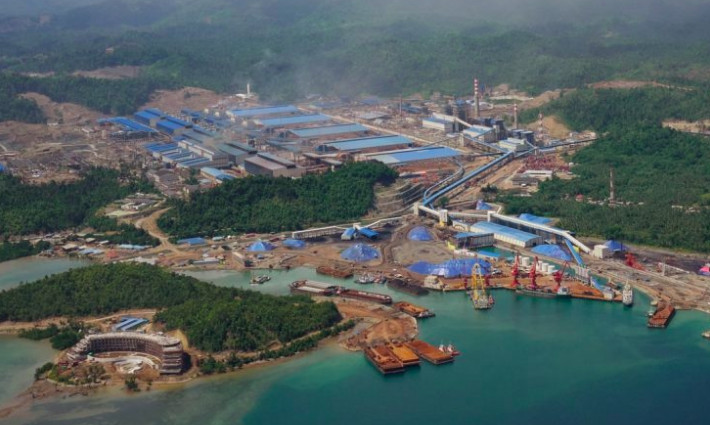Popular Reads
Top Results
Can't find what you're looking for?
View all search resultsPopular Reads
Top Results
Can't find what you're looking for?
View all search resultsWhy EU imposes countervailing duties on Indonesian steel from Morowali
Most of China’s investment projects are export-oriented with capital, operational financing, services related to production, marketing and even labor supplied directly by the parent companies.
Change text size
Gift Premium Articles
to Anyone
T
he growth of Chinese investment globally, including its use of industrial subsidies and deployment of state-owned enterprises, has prompted reactions from developed countries, notably the United States, Japan and the European Union. This is due to the common opinion that China is implementing a grand strategy to help its own industry by transferring its domestic-excess capacity overseas via foreign direct-investment ventures financed by the government.
The EU coined this practice as transnational subsidy and perceived accordingly that it is a prohibited practice of subsidy, not in conformity with the legal framework of subsidies regulated under the World Trade Organization.
The transnational-subsidy practice is observed to take the form of (i) investment and relocation assistance from the government of China (GOC) to the domestic industries which expand their production facilities to other countries, and exports the products throughout the world, including to China; and/or (ii) strategic cooperation between the GOC and other governments to build a special-industrial area wherein the Chinese relocated company operates to produce goods intended for export.
According to what the EU stipulates in its guidelines, this practice is a prohibited form of subsidization against which an anti-subsidy investigation could be carried out, or directly challenged in the WTO dispute-settlement body. Therefore, in 2019, the EU initiated an anti-subsidy investigation into imported-fiberglass fabrics originating from Egypt and China.
The EU authority argued that (i) the Egyptian exporting producer of the investigated product is located in a special-economic zone established under the cooperation between the GOC and the Egyptian government; (ii) the exporting producer is under the control and supervision of its Chinese parent company and the Chinese agency responsible for outbound investment, and (iii) the exporting producer benefited from financial contributions made through Chinese state-owned banks.
As a result, in June 2020, the EU authority imposed additional anti-subsidy duties on imports of fiberglass fabrics from Egypt and China by 10.9 percent and 17-30.7 percent respectively.
The subsidy instrument itself transforms from time to time. Initially, this instrument was mainly used by developed countries to encourage the growth of their agricultural and manufacturing sectors.
In 1995 the Uruguay Round of WTO negotiation brought in an agreement that specifically regulates subsidies, namely the WTO Subsidy and Countervailing Measures Agreement. This agreement aims to discipline subsidy instruments by defining counteravailable subsidies, prohibited subsidies, the flexibility of developing countries and procedures for anti-subsidy investigations.
The prohibited subsidy in the agreement is defined as a financial contribution given by the government/public agency aimed at boosting export performance and import substitution. This category of subsidy is believed to give rise to unfair trade-distorting effects, and toward this subsidy, a country can challenge the policy directly to the WTO dispute-settlement body without going through any formal anti-subsidy investigation.
Meanwhile, the international-trade landscape continues to change dramatically. Subsidy policy is no longer a purely domestic domain. More and more examples of cross-border subsidization can be found. Chinese Prime Minister Li Keqiang, for example, stated at the 17th ASEAN-China Summit in 2014 that “[…] We encourage competitive Chinese producers of iron and steel, cement and plate, etc to shift their operations to ASEAN countries to meet the local needs of infrastructure development via investment, leasing and loan and lending to achieve mutual benefit".
China has been a major foreign direct investor in Indonesia. Most of China’s investment projects are export-oriented with capital, operational-financing services related to production, marketing and even labor supplied directly by the parent companies. Many of them are also involved in the sectors vulnerable to trade remedies such as metal goods, mining, energy and other extractive industries.
This has brought forth a series of the EU antidumping and anti-subsidy investigations against imports of various Indonesian stainless-steel cold-rolled products from Sulawesi since 2019. Due to the concerted effort by the Indonesian government, the antidumping investigation has been terminated. However, the anti-subsidy investigation has resulted in the imposition of additional anti-subsidy (countervailing) duties of 13.5-21.44 percent. This is, among others, due to the following allegations: Indonesia sought Chinese investment as part of its strategy for the development of downstream nickel industry via cooperation with the GOC at the Morowali industrial park in Central Sulawesi.
Confronting the allegations, Indonesia has explained to the EU the objective of the downstream nickel industry in Morowali in cooperation with China, but to no avail. The remaining course now available is challenging the EU policy at the WTO.
All in all, we remain firm in the belief that foreign direct investment has played a very important role in Indonesia’s economic growth. It should serve as a stimulus for the transfer of technology, efficiency and productivity of the industry in Indonesia. However, we need to be fully aware of its trade repercussions, since the EU’s definition of a prohibited subsidy is closely related to China’s investment in Indonesia.
One last note of concern is that not only did this EU penalty make Indonesia’s stainless-steel products less competitive in the EU market, but it also instigated other foreign authorities to carry out similar investigations, using the EU’s allegation as a template.
***
The writer is a senior official of the Trade Ministry. The views expressed are personal.










